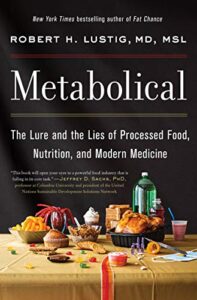Is it possible that everything we’ve been taught about nutrition is wrong?
Are the nutrition and health guidelines developed by the USDA and FDA designed to improve our health, or are they contributing to the epidemic of diseases such as diabetes, heart disease, dementia, obstructive sleep apnea, autoimmune disease and others?
Are doctors being taught how to prevent sickness or how to treat symptoms?
Are “Big Food” and “Big Pharma” companies looking out for our health or are they more concerned with generating profits for their shareholders?
These are just a few of the questions that Dr. Robert Lustig explores in his book Metabolical: The Lure and the Lies of Processed Food, Nutrition, and Modern Medicine.
Before picking up Metabolical, I already had strong opinions about the questions raised above. I’ve read a number of books about nutrition and the impact the modern diet has on our health. Books such as Grain Brain, Wheat Belly, The Complete Guide to Fasting, The Diet Myth, and It Starts With Food have already convinced me that what we’ve been taught about health and nutrition is wrong, and that I needed to take control of my own nutrition guidelines. Metabolical simply reinforced what I already knew and, if anything, solidified the reasons behind it with sound, scientific research.
Metabolical is an interesting read as Lustig documents what he has learned through his medical research and practice as a pediatric endocrinologist at UCSF. He shares more than opinions about why processed food, modern medicine, and government nutrition guidelines are contributing to the epidemic of disease and declining health. He digs into the science about how the body works, how the food we eat affects bodily processes, and how what we’re being taught impairs those processes, or as Lusting says it, make us metabolically ill.
Throughout the book, Lustig hammers home two key concepts, which he refers to regularly. When determining your diet (i.e. what to eat), his overarching guideline is – “Protect the liver. Feed the gut.” And when it comes to choosing food, his mantra is – “It’s not what in the food, it’s what’s been done to the food that counts.” He contends that if you follow these two key concepts, you will start making better decisions about what you eat, which will lead to improving your health and longevity.
Lustig’s book is well researched, well documented, and well written. He even finishes the book with some general recommendation about how we can reverse the course we’re on. I particularly like how he advocates for each of us to take our health into our own hands and vote with our forks and wallets. I agree that making better choices is the way to force food and drug companies to change. If we can collectively impact their bottom line by making better choices, it will coerce them to serving our best interests.
For me, while I liked the book, I’m not putting it in my Must Read category because it didn’t cover any new ground, and it didn’t offer up enough specific recommendations on things I can do to improve my diet, nutrition, and health. If you’ve read some of the books that I mentioned earlier, Metabolical is going to rehash the same ground and go a level deeper. In that case, I would recommend passing on it. On the other hand, if you haven’t read any of those books, I would strongly encourage you to read Lustig’s work. It will open your eyes and expose how Big Food and Big Pharma companies are manipulating and controlling the health recommendations we are being told, and how those recommendations are not in our best interests.


Doctor Lustig’s book Metabolical is an eye opener. Having practiced medicine for over 40 years both as a family physician and as an emergency physician, none of his news is particularly new. Moreover, I have read the negative critiques of the book, and finding them disturbingly humorous. Few critics attack his veracity, but rather his political views and cynicism. For me to avoid being cynical is a very difficult task, I have watched the gradual degradation of the standard American diet to the point where I believe it is imperative that physicians speak out, regardless of whether they are viewed as Bing viewed as polemic or not.
I have a financial interest in reversing the course of chronic disease: I do not want Medicare and Social Security to become bankrupt at the very time I’m needing it.